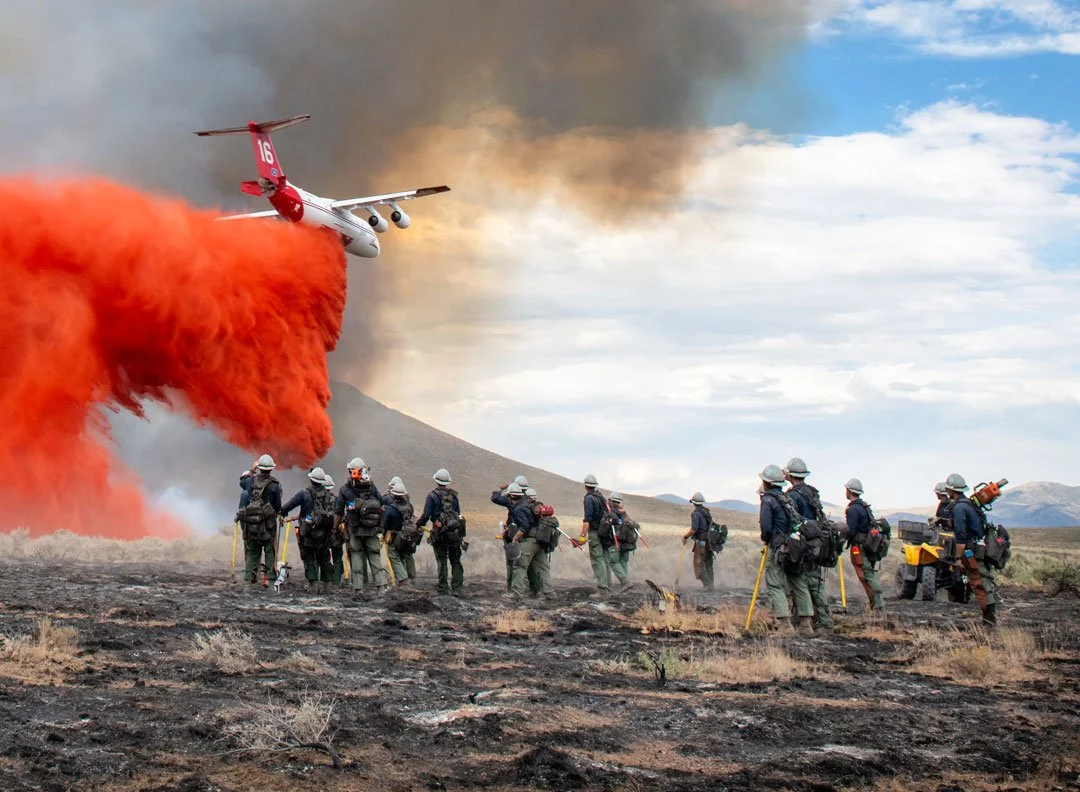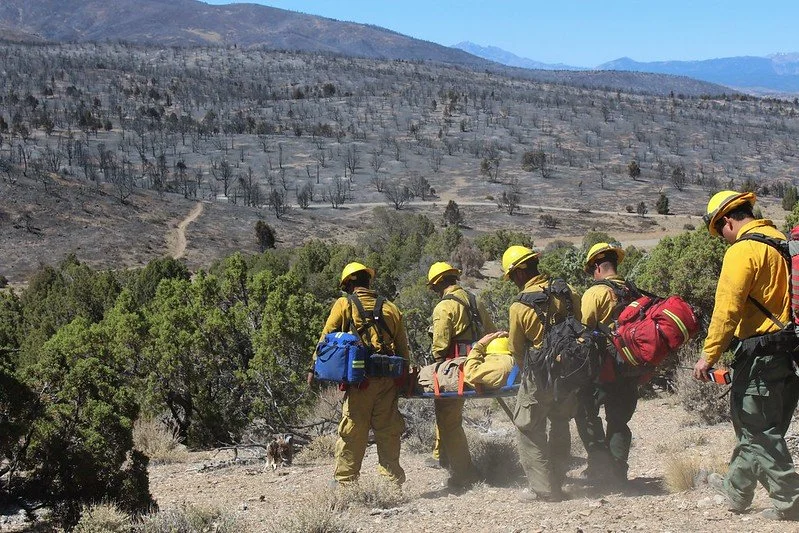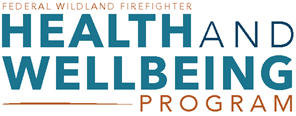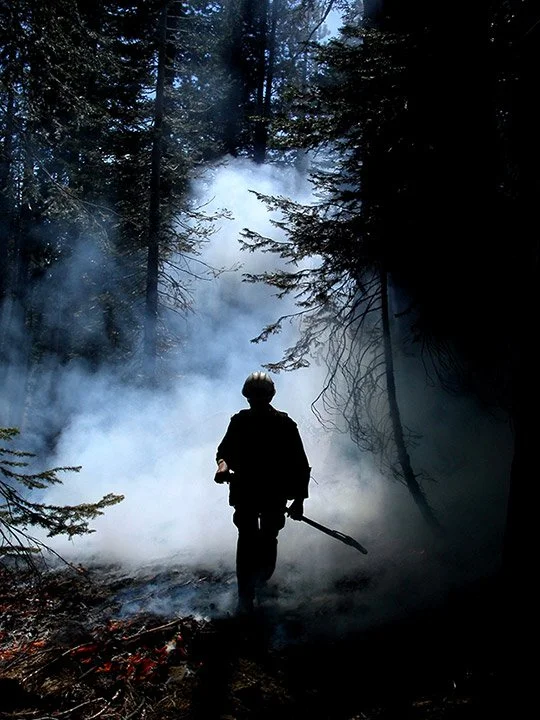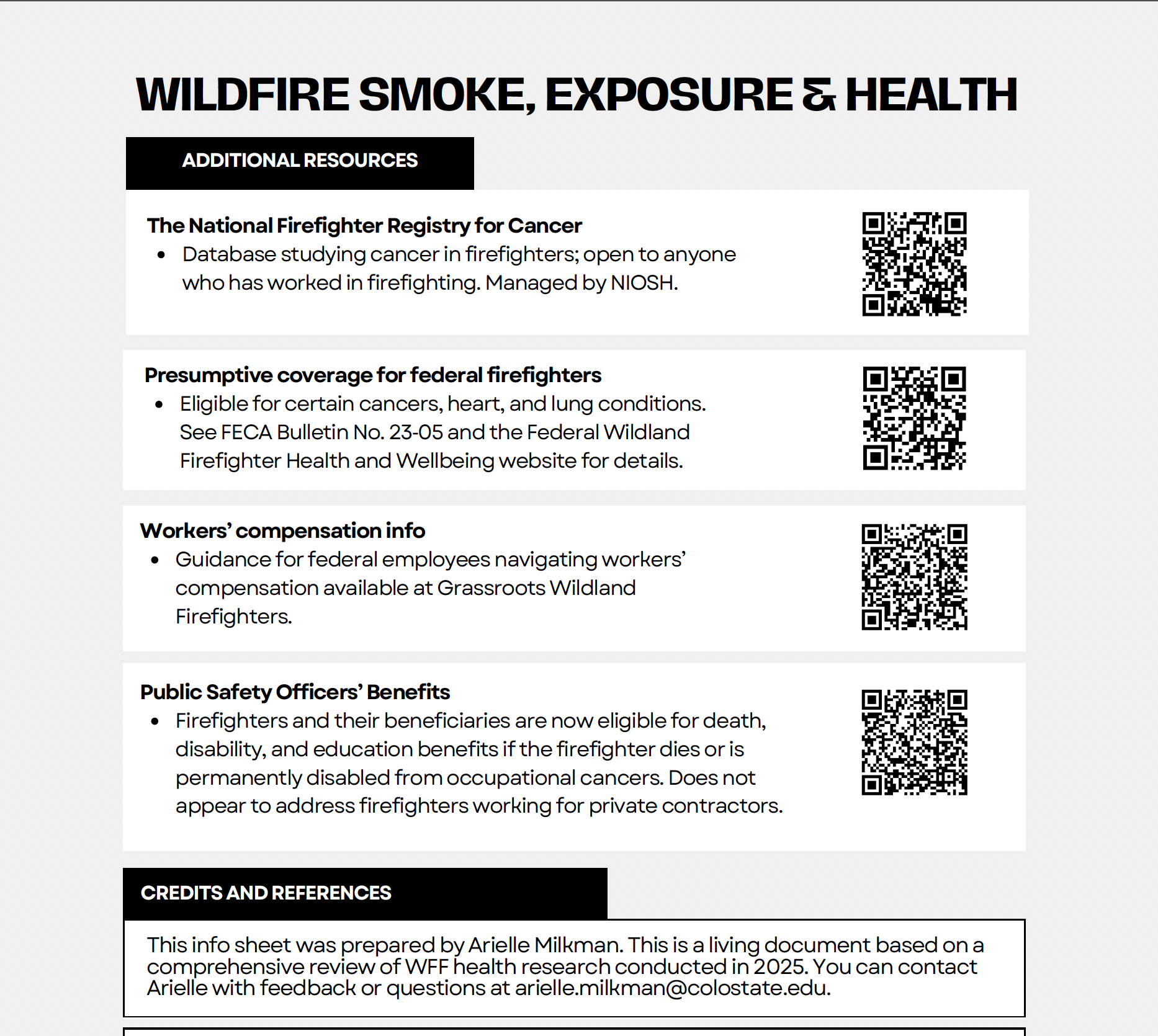Firefighter Health & Safety Resources
Our effort to act as a repeater in a growing network of firefighter wellbeing resources. These resources are not produced by Grassroots Wildland Firefighters, but they are ones that we believe stand to benefit our workforce. Don’t let perfect get in the way of good. Explore, share, and engage.
Mental Health Education
A collection of resources to help wildland firefighters better understand mental health, substance abuse, and mental illness challenges they may be facing.
Presumptive Health Coverage
Federal wildland firefighter request for presumptive health coverage for exposure to environmental hazards.
Injuries and Smoke Exposure
Getting injured in the line of duty comes with complicated paperwork and tough questions. We've compiled resources to help you navigate the Federal Office of Workers' Compensation process, plus research on smoke exposure and long-term health impacts.
Therapy Access
Big News for Wildland Firefighters: The Department of the Interior and the U.S. Department of Agriculture Forest Service recently announced that federal wildland firefighters and dispatchers now have access to expanded, year-round mental health services

The continued success of our advocacy relies on the story of the wildland firefighter and our access to it
Presumptive Health Coverage
Federal wildland firefighter request for presumptive health coverage for exposure to environmental hazards.
-
Federal wildland firefighters (WFFs) are a national shared resource, who regularly work for extended periods of time while exposed to extremely hazardous environmental conditions to support fire suppression and management activities. Federal wildland firefighters are regularly exposed to harmful environmental hazards, such as but not limited to; smoke, silicates, and chemicals that are known to cause serious acute and chronic health issues.
16-30% increased risk of mortality from cardiovascular disease for WFFs (1)
8-43% increased risk of mortality from lung cancer for WFFs(1)
Unlike structural firefighters, WFFs do not use self-contained breathing apparatus (SCBA) or wear non-porous personal protective equipment (“turnouts”) while engaged in wildland fire suppression or prescribed burning.
Multiple State and local fire departments have presumptive healthcare coverage for Firefighters who have been exposed to environmental hazards that occur on the job (OTJ) from known environmental hazards.
49/50 states offer Firefighters presumptive coverage for OTJ related cancers (2)
42/50 states offer Firefighters presumptive coverage for OTJ related cardiovascular disease (2)
Given the average annual duration of exposure to environmental hazards federal WFFs encounter, federal WFFs are requesting presumptive health coverage through legislative efforts.
-
Federal Wildland Firefighters are regularly exposed to environmental hazards while on the job and during off- hours while sleeping outdoors at incident command posts and at fire camps. Some of these hazards include but are not limited to; smoke and silicate inhalation, off-gassing from burning structures/vehicles, and chemicals used during the suppression of wildland fires and during the management of prescribed fires. Given the continued increase in intensity and duration of wildfires and the increased proximity to the urban interface and communities, federal wildland firefighters and incident management teams are more regularly exposed to environmental hazards and harmful chemicals. There is currently no presumptive healthcare coverage in place to protect federal wildland firefighters from higher risk of mortality from on-the-job exposure to environmental hazards.
-
Grant presumptive health coverage to permanent and temporary federal wildland firefighters for acute and chronic illness due to environmental job-related exposure including but not limited to smoke and silicate inhalation and firefighting chemical exposure.
Establish wildland firefighter time-in-service exposure time frames for coverage (for example 12 months time-in-service to receive coverage)
Create National Federal Wildland Firefighter Cancer and Cardiovascular Disease Database
Develop and adhere to recommendations and mitigation strategies to minimize exposure to environmental hazards (ie. smoke, silicates, and hazardous chemicals regularly used in suppression and management activities)
News Resources
Department of Labor announces streamlined claims process for federal firefighters with certain occupational illnesses.
Secretary Walsh slated to discuss changes with firefighters’ union in Los Angeles
WASHINGTON – The U.S. Department of Labor issued a policy bulletin announcing changes by its Office of Workers’ Compensation Programs to assist federal firefighters with certain occupational illnesses by making it easier for claimants to file certain claims and improving transparency in how claims are processed.
-
The Centers for Disease Control and Prevention reports that cancer is a leading cause of death among firefighters, and research suggests firefighters are at increased risk of certain types of cancers compared to the general population. Each year, OWCP receives approximately 2,600 workers’ compensation claims from federal firefighters. Of those, about 175 claims include conditions such as cancer, heart disease and lung disease.
“Among our nation’s public service workers, federal firefighters are some of the bravest,” said Office of Workers’ Compensation Director Christopher J. Godfrey. “Historically they have faced unique challenges in establishing causation for occupational disease claims. The policy changes we are making will help us improve our service to federal firefighters and assist them through the claims process.”
Later today, Secretary of Labor Marty Walsh and OWCP Director Godfrey are scheduled to meet with members of the International Association of Fire Fighters and the National Federation of Federal Employees in Los Angeles to discuss the policy changes.
The “Special Case Handling in Certain Firefighter FECA Claims Processing and Adjudication” bulletin puts into effect changes to ease the evidentiary requirements needed to support claims filed by federal employees engaged in fire protection and suppression activities for certain cancers, heart conditions and lung conditions.
To implement the policy changes, OWCP has created a special claims unit to process federal firefighters’ claims. The unit consists of existing staff specifically trained to handle these claims. The agency is also providing comprehensive training to the unit’s examiners on the impacts of the policy changes, and working with federal agencies including the departments of Agriculture, Defense, Homeland Security and Interior to explain the changes in policy and procedures.
Find the most up-to-date information on claims processing for federal firefighters.
Learn more about the Office of Workers’ Compensation.
Coverage Include:
1. Esophageal Cancer
2. Colorectal Cancer
3. Prostate Cancer
4. Testicular Cancer
5. Multiple Myeloma
6. Non-Hodgkin’s Lymphoma
7. Leukemia
8. Kidney Cancer
9. Bladder Cancer
10. Brain Cancer
11. Lung Cancer
12. Mesothelioma
13. Buccal Cavity / Pharynx Cancer
14. Larynx Cancer
15. Melanoma
16. Thyroid Cancer
17. Hypertension
18. Coronary Artery Disease
19. A sudden cardiac event or stroke while, or not later than 24 hours after, engaging in engaged in the prevention, control, and extinguishment of fires or response to emergency situations where life, property, or the environment is at risk, including the prevention, control, suppression, or management of fires
20. Asthma
21. Chronic Obstructive Pulmonary Disease (COPD)
22. Pulmonary Fibrosis
Mental Health Education
Grassroots Wildland Firefighters Request Expansion of Mental Health Programs and Support Services for Federal Wildland Firefighters and their Families.
Grassroots Wildland Firefighters 2022 Mental Health Awareness News Resources
“We all must Urge Congress to move Tim’s Act forward. Wildland firefighters show up when they’re called to duty, no matter the circumstances; now the time has come for lawmakers and Americans to show up for firefighters.”
– Pete Dutchick, Comprehensive Health and Wellbeing Subcommitee Team Member
Over the last 18 months, the Grassroots Wildland Firefighters Comprehensive Health and Wellbeing Subcommittee has focused on better understanding the issues surrounding firefighters’ mental health. We’ve collected personal stories, mined new and existing data, surveyed the partners and spouses of federal wildland firefighters, and worked with federal, state, and local agencies. We’ve developed a more accurate picture of the mental health concerns in our community and how they can be mitigated. It is our hope that this knowledge will help shape legislative and administrative reforms, which in turn will establish programs that can help alleviate the mental health burden firefighters face.
After months of correspondence and collaboration, the Bipartisan Infrastructure Law (BIL) was passed into law in Fall 2021. The bill is currently being implemented, and it includes measures to build the foundations of mental health support programs throughout some of the federal agencies. Yet our work is far from complete.
We are at the start of another intense and already catastrophic fire year. Federal land management agencies continue to grapple with a staggering shortage of wildland firefighters, which is widely recognized as a huge safety concern throughout the ranks. Those who remain are left doing more with less. This reality comes at a steep cost: to our personal safety; to our partners and families; and to the mental health and wellbeing of the federal wildland fire community.
• A recent study found that wildland firefighters reported rates of anxiety, depression, PTSD, and suicidal ideation at rates two to 10 times that of the general population. The Firefighter Behavioral Health Alliance found that firefighters are more likely to die by suicide than in the line of duty.
• In Grassroots Wildland Firefighters’ survey, 60.2% of partners and spouses reported that their wildland firefighter had been impacted by an incident at work that resulted in mental health challenges. Meanwhile, 78.1% of those at home experience frequent stress due to their partner’s absence.
• In a survey regarding barriers to recruitment and retention, 78.5% of wildland firefighters said they suffered from mental health issues they attributed to the stresses of fighting fire. Only a third of respondents felt they could seek mental health care during fire season.
“These stressors greatly affect our ability to protect the public and serve the communities we love. Yet we believe there is hope on the horizon.”
– Kelly Ramsey, Comprehensive Health and Wellbeing Subcommitee Team Member
While the BIL provides short-term reform and limited funding for certain programs, the passage of Tim’s Act remains critical. Tim’s Act provides long-term funding to build the sustainable mental health programs needed to better care for our federal wildland firefighting workforce and their families. Building upon successful programs adopted by the military, state and local fire departments, law enforcement, and other first responders, the legislative reforms we support focus on the creation of:
• Effective mental health awareness campaigns
• A mental health education program, including onboarding curriculum
• An extensive peer-to-peer support network for wildland firefighters and their immediate family
• A meaningful expansion of the Critical Incident Stress Management Program, including dedicated follow-up with employees affected by work-related incidents
• A dedicated mental health support service – specific to wildland firefighters, first responders, and immediate family – with culturally-relevant, trauma-informed clinicians
• A request to the Office of Workers’ Compensation Programs (Federal Firefighter Special Claims Unit) to recognize Post-traumatic Stress Disorder and psychological stress-related injuries as correlated to fire protection and suppression activities
As current and former federal wildland firefighters, Grassroots Wildland Firefighters’ members have experienced the loss of friends and colleagues to suicide, to wildfire line of duty deaths, and to cancers and cardiovascular illness. We have struggled through long shifts and close calls. We stand together with our sisters and brothers in our mission to unify the federal wildland fire community and our partners. We need your help.
Therapy Access
Federal wildland firefighters and dispatchers now have access to expanded, year-round mental health services.
By working closely with federal, state, and local fire agencies, and partnering with legislators, the subcommittee helped shape language in the Bipartisan Infrastructure Law that led to the creation of the Joint Interagency Behavioral Health Program and the first National Wildland Fire Mental Health Summit.
We fully recognize that implementing a comprehensive behavioral health program across five federal agencies is a complex and significant undertaking. We are deeply grateful for our DOI and Forest Service partners who continue to work diligently to carry out this initiative through a phased, thoughtful, and data-driven approach.
To access care through this service, call 1-800-424-4051. The call center will review your eligibility, triage your clinical needs, and connect you with psychotherapy services in your area. Please plan to spend about 15 minutes on your first call to the call center.
The GWF Comprehensive Health and Wellbeing (CHWB) Subcommittee—made up of wildland firefighters, veterans, and mental health professionals—has spent the past five years collecting research, field data, and firsthand experiences to better understand the mental health needs of the wildland fire community.
Mental Health Practitioner Map
Big thanks to Hotshot Wellness for stepping up and building an interactive map to help connect wildland firefighters with mental health support. They're doing important work for our community. Check out their mission and learn more on their website.
Injuries & Smoke Exposure
A Guide to Navigate On-The-Job Injuries for Federal Wildland Firefighters
Some words of advice from people who have successfully navigated the OWCP process:
It helps to have access to a government computer
You can speak directly with an OWCP caseworker, and only need to work with an agency representative if you need help with something.
You don’t need to ask permission to get the help you need. If your doctor prescribes any equipment that will help you on the road to recovery, that can be processed directly through OWCP, and agency representatives don’t need to be involved. Examples include exercise equipment all the way to office chairs and anything else you need to get back to 100% as soon as possible.
Who pays the bills? Your agency will be billed for any OWCP benefits in the following years
We highly recommend staying in touch with your OWCP caseworker and consulting them about any decisions such as your return to work, worker’s compensation advice, and any other decision on your road to recovery.
Wildfire Smoke Exposure & Health
Wildland firefighters are exposed to a wide range of hazardous environmental factors during their work. The hazard that has been most studied is smoke.
The Montrose Translational Health Lab is conducting a Wildland Firefighter Science Needs Assessment survey 2025-2026. More info can be found by visiting their website or scanning the QR codes below.


